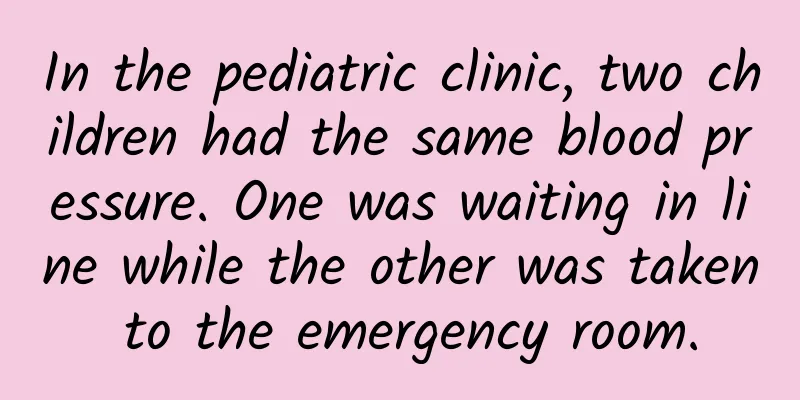In the pediatric clinic, two children had the same blood pressure. One was waiting in line while the other was taken to the emergency room.

|
From morning to night, the pediatric clinic is always the busiest one. Li Li is a pediatric nurse. In her early 30s, she is already a very experienced teacher. Although she is very busy with clinical work, she always pays attention to teaching young people something. On that day, she was giving injections to sick children with two interns, and the blood pressure of one of the children immediately made her alert. Before giving the patient an injection, the intern who had just entered the hospital was still muttering: "The child's blood pressure is so low. If my blood pressure was this low, I would have fainted a long time ago, and so on..." Indeed, the blood pressure of a baby they just saw was only 75. Seeing the instructor calmly continue to give injections, they did not dare to ask anything. Here is an explanation: In the emergency department, the level of low blood pressure that is specific to infants should be less than 70. In other words, excluding clear factors, if the blood pressure is only over 70, it is generally not considered that the infant has any serious problems. However, what they didn't expect was that when giving the next child an injection, they could clearly feel the teacher's nervousness: she nervously measured the child's blood pressure again, then felt the child's pulse with her hand, and then nervously touched the child's head. Obviously, at that moment she wanted to know immediately what happened to the child. However, the blood pressure of over 80 on the sphygmomanometer confused the intern: this blood pressure is better than the previous one, why does it look wrong! Just when I was about to ask something, I saw the teacher and the child's mother communicating quickly about rescue or something. Only then did they realize that the child's complexion was obviously abnormal, with a bluish tinge in the white. He was in a bad mental state, and he didn't cry like other children. When he saw the nurse coming, he just hid away in resistance. The doctor arrived quickly and immediately checked the child's pulse and breathing. Body temperature, pulse, respiration and blood pressure are the four major vital signs. In any case, if only these four vital signs are normal, there is probably no danger to life. However, when he found that the child's breathing rate was very high, he immediately told everyone to rush the child to the emergency room. Then, a group of people picked up the child and ran to the emergency room. Arriving at the emergency room, the child was immediately given an intravenous infusion channel and various tests were performed. At this point, although the family had not paid the fee, saving the child's life was the most important thing. The most urgent thing was to find out what happened to the child. After examination, it was found that the child had suffered from heat stroke because he had been playing in the midday sun for too long. Heat stroke is a type of heatstroke. The pathogenesis is mainly the sudden destruction of the body temperature regulation mechanism, resulting in obstruction of heat dissipation, manifested as central nervous system depression, less sweating, body temperature exceeding 41 degrees, and severe physiological and biochemical abnormalities. The clinical manifestations are characterized by high fever, no sweating, and impaired consciousness. Before, the mother thought the child had a fever again, so she took him to the hospital for an IV drip. Unexpectedly, it turned out to be a severe heat stroke. Afterwards, everyone quickly cooled the child down and at the same time, provided symptomatic treatment such as brain protection and fluid replacement. Fortunately, the child only suffered from a mild heat stroke. If he had been exposed to the sun for a while longer, he might have suffered from a severe heat stroke. By then, he might even have suffered from multiple organ failure, including the brain. Afterwards, the interns praised Teacher Li’s clinical experience and aspired to become excellent medical staff like Teacher Li. [Warm Tips] Follow us, there are a lot of professional medical knowledge here, revealing the secrets of surgical anesthesia for you~ |
<<: Presbyopia suddenly disappears? Ophthalmologist: Be careful!
Recommend
2023CCHIO Exclusive Interview | Professor Gao Shegan: The incidence trend and treatment status of esophageal cancer
In the past few decades, the incidence of esophag...
How long after medical abortion can I have sex? What should I pay attention to?
Abortion is extremely harmful to women's bodi...
Female liver meridian diagram
Meridian therapy is very popular among many femal...
How to distinguish the quality of yellow peaches? What is the color of yellow peach flesh?
The skin and flesh of yellow peaches are both gol...
4 bad habits that make women unable to keep blood
Anemia often occurs in women. Some women suffer f...
Is it a boy or a girl if morning sickness is severe?
If the baby has severe morning sickness, is it a ...
Is it easy for embryo fusion to implant?
Generally speaking, for women who cannot have chi...
What should women eat when they have weak waist and knees?
Weakness in the waist and knees is a disease term...
Does Schefflera need to be topped? When is the best time to top Schefflera?
Schefflera chinensis is a common plant in life. I...
What are the reasons why my period hasn't come after ten days?
The development time of boys and girls is differe...
The normal puerperium is after childbirth.
Postpartum recovery is very important for mothers...
Why do women wear underwear?
Why do women wear underwear? This question makes ...
How much do you know about the health benefits of coffee?
Author: Zhang Yu, researcher at Chinese Center fo...
What to do if you have diarrhea in the fourth month of pregnancy
Many expectant mothers, especially in the early s...
Is it really okay to drink red wine during menstruation?
Red wine is one of many types of alcohol, but it ...









